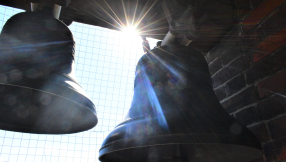International Copyright Part II: from a "Dead Composer"
There was a lot of feedback on my recent article regarding copyright issues as being of an international concern for Christians. Quite frankly, I was somewhat dumbfounded by some of the responses I received so I decided to share with you some of the warped logic I heard and some of my own personal experiences with Christian companies, churches and artists being a big part of the problem.
Let me share two examples from two of the world's largest churches.
1. In January of 2006, I came across a video of our song being performed in a mega church. It was with a choir of a couple hundred, a full orchestra, and a duet singing it with thousands present. It was a wonderful arrangement and professionally done. I was so excited to hear it. I e-mailed the church to express my appreciation and to request a copy of the music. Although I never heard back from them, the video was removed from their website the next day even though every other performance of all their many choirs from the last several years remain.
2. The second example is of another church that has thousands in attendance every Sunday and which may indeed be the world's largest. The church was selling about 20 different CDs on the church's website that contained our song. I contacted them to see if I could get some copies of the CDs and to make them aware that all of them had been done without permission, without our knowledge and without paying royalties. Since the church was merely selling them and were not the record producers, I thought they would want to know since their church was one of the world's best known with one of the most famous pastors of all time. The next day, someone went on the church's website and removed the title of our song from the song list of each of the CDs. Now understand that they were still selling the CDs, and our song was still on each of them, they just removed our title from the list so no one would know.
When you have Christian record companies and the world's largest churches taking actions like this, it is disappointing to say the least!
Now let me share some of the reasoning that Christians gave for illegal copying in response to my article:
One person said that the fault of the illegal copying was with the greedy record companies, because the record companies charged too much for their CDs. Since they charged "too much," then this made it OK for the music to be copied without permission. Hey, if they cost too much, don't buy them. Perhaps some in the record industry would like to give their input, but my guess is that they actually lose money on many if not the majority of releases.
Here was the logic from another party, which was actually a man in a Christian singing group. The young man said in essence that he had made illegal copies of a CD from a name artist and gave the copies to friends including a minister of music at a church. The minister of music listened to the CD and liked it so much that he invited the artist to his church to perform. The artist got a "gig" and was able to sell "legal" copies of his CDs at the concert. The question to me by the infringer was "Did my making the illegal copies hurt or help the artist?" ...Or does the "end, justify the means?"
Another gentleman, who was also a Christian musician, suggested to me the bible does not even support the idea of intellectual property rights and therefore, there was no such thing as giving a valid "moral" argument for the refraining from copyright infringement, only a "legal" one. There were many other bizarre justifications as well.
I've about come to the conclusion that this is hopeless when churches, music companies, Christian artists, and regular church members are all participants in the illegal uses of works from the Christian creative community. Make no mistake, every Christian artist is damaged and hurt by this blatant theft.
If you make your decisions based on what some other Christians are doing in regards to copyright, you might be hurting your Christian brothers and sisters who are called by God to use their talents for His glory and also to feed their families. This may have to be addressed on a personal level with each of us coming to terms with the implications.
Just because we live in a different part of the world, does not mean that any of us are "second class" people. We are each children of God and will spend eternity together with no boundaries. The next time you make an illegal copy of music, no matter where in the world the song originated, imagine that the song's creator is sitting in the room with you and along with their family. Would you still take the same action?
Let's encourage the Christian community to keep providing new and fresh music materials for our times of worship. Let's encourage the Christian artists to be able to make a living from their work. Let's not "muzzle the ox." We each need to realize that when we sing a Christian song we love, it was created by the inspiration of God by a living person, not a "Dead Composer."
James M. Stevens
Christian Today
Senior Music and Culture Advisor
Dr. James Michael Stevens is a prolific musician and published composer of over 200 songs. Winner of numerous ASCAP Standard Awards for Composition, he has formally served as President of the Southern Baptist Theological Seminary Chapter of the American Choral Directors Association (ACDA), and currently resides in Nashville, Tennessee as Chairman of the Music Department at Free Will Baptist Bible College.
www.jamesmstevens.com
jstevens@fwbbc.edu













